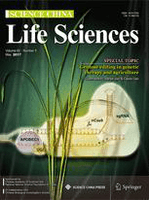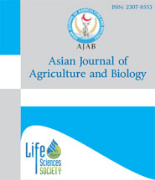
Biology-Basel
Scope & Guideline
Innovating Knowledge in Life Sciences
Introduction
Aims and Scopes
- Molecular and Cellular Biology:
Research related to the molecular mechanisms that govern cellular processes, including gene expression, protein function, and cellular signaling pathways. - Ecology and Environmental Biology:
Studies on ecological interactions, biodiversity, and the impacts of environmental changes on species and ecosystems. - Genomics and Bioinformatics:
Utilization of genomic techniques and computational tools to analyze biological data, understand genetic diversity, and explore evolutionary relationships. - Physiology and Pharmacology:
Investigations into physiological processes and the effects of various compounds on biological systems, including drug discovery and development. - Plant and Agricultural Sciences:
Research focusing on plant biology, genetics, and the development of sustainable agricultural practices, including the role of microorganisms in plant health. - Zoological and Veterinary Sciences:
Studies related to animal health, behavior, and conservation, including the impacts of diseases and environmental stressors on wildlife.
Trending and Emerging
- Microbiome Research:
The study of microbiomes and their effects on health, agriculture, and ecosystems is a rapidly growing field, with increasing recognition of their importance in various biological processes. - Climate Change Impact Studies:
Research examining the effects of climate change on biodiversity, ecosystem functions, and species adaptations is trending as concerns over environmental changes escalate. - Gene Editing and CRISPR Technologies:
There is a rising interest in gene editing applications, particularly CRISPR technologies, for agricultural improvements, disease modeling, and therapeutic developments. - Neuroscience and Neurobiology:
Research focusing on the molecular and cellular underpinnings of neurological diseases and cognitive functions is gaining prominence, especially in the context of aging populations and mental health. - Sustainable Agriculture and Biotechnology:
Emerging studies highlight innovative agricultural practices, including biotechnological approaches to enhance crop resilience against environmental stressors and improve food security.
Declining or Waning
- Traditional Taxonomy:
Research focused solely on species classification and descriptions has become less frequent as integrative approaches combining molecular and ecological data gain popularity. - Single-Factor Studies:
Investigations examining the impact of a single variable on biological processes are declining in favor of more complex, multifactorial studies that reflect real-world interactions. - Basic Laboratory Techniques:
Publications centered on basic methodologies without novel applications or insights are decreasing, as there is a trend toward more innovative and applied research. - Invasive Species Management:
Research specifically targeting the management of invasive species has decreased, potentially overshadowed by broader ecological studies that include multiple species interactions. - Conventional Medicinal Plant Studies:
The focus on traditional medicinal plants without a molecular or pharmacological context has waned in favor of studies emphasizing biochemistry and pharmacology.
Similar Journals

Science China-Life Sciences
Advancing life sciences through groundbreaking research.Science China-Life Sciences, published by SCIENCE PRESS, is a premier academic journal that stands at the forefront of innovative research and discoveries in the fields of life sciences, spanning crucial areas such as agricultural and biological sciences, biochemistry, genetics, molecular biology, and environmental science. With an impressive Q1 ranking in its respective categories—ranked #5 in Agricultural and Biological Sciences, #7 in Environmental Science, and #17 in Biochemistry, Genetics and Molecular Biology—this journal is recognized for its rigorous peer-review process and significant impact within the scientific community, as reflected in its high percentiles (97th and 92nd). Maintained as an Open Access publication, it ensures broad dissemination and accessibility of research findings, fostering collaboration and knowledge sharing among researchers, professionals, and students alike. Given its position in the research landscape and its commitment to high-quality scholarship, Science China-Life Sciences plays a vital role in advancing life sciences research, supporting scientists in addressing global challenges through innovative biological solutions.

FASEB JOURNAL
Fostering Collaboration in Cutting-Edge ResearchFASEB JOURNAL, published by Wiley, stands as a leading interdisciplinary platform in the realm of biological sciences, prominently featured in the United States. With an impressive 2023 impact factor placing it in the Q1 category across various fields including Biochemistry, Biotechnology, Genetics, Molecular Biology, and Medicine (miscellaneous), the journal is recognized for its substantial contribution to advancing knowledge and innovation. It serves as a vital resource for researchers, professionals, and students alike, providing high-quality, peer-reviewed articles that explore the molecular and cellular mechanisms underlying health and disease. The FASEB JOURNAL not only emphasizes accessible scientific communication but also fosters collaboration within these dynamic fields, making it an essential publication for anyone engaged in cutting-edge life sciences research. To explore more about the journal's offerings and access its vast repository of scholarly articles, visit their official page.

CURRENT GENOMICS
Navigating the evolving landscape of genetic science.CURRENT GENOMICS is a premier journal published by Bentham Science Publishers that focuses on the expansive field of genomics, including both clinical and molecular genetics. With the ISSN 1389-2029 and E-ISSN 1875-5488, this esteemed journal has been disseminating significant scientific insights since its inception in 2000 and continues to contribute to the field through 2024. Based in the United Arab Emirates, CURRENT GENOMICS boasts a Q3 ranking in both the genetics and clinical genetics categories for 2023, reflecting its growing impact in the scientific community. Although not an open-access journal, it provides valuable content that supports researchers and professionals in navigating the complexities of genetic research and its applications. By publishing original research articles, reviews, and case studies, CURRENT GENOMICS aims to foster a deeper understanding of genomic science and its implications for medicine, thus playing a critical role in the advancement of genetics and biomedical research.

TURKISH JOURNAL OF BIOLOGY
Empowering Researchers with Open Access to Cutting-edge ScienceTURKISH JOURNAL OF BIOLOGY, published by the Tubitak Scientific & Technological Research Council Turkey, is an esteemed peer-reviewed periodical that serves as a pivotal platform for advancing the fields of Agricultural and Biological Sciences. With a strong focus on innovative research across various biological domains, including Cell Biology, Genetics, and Microbiology, this journal not only fulfills the academic community's quest for high-quality research but also fosters collaboration and knowledge sharing among researchers. The journal's notable impact factors reflect its commitment to excellence, with its latest rankings placing it in Q2 in Agricultural and Biological Sciences (miscellaneous) and in Q4 for several other categories. By offering open access to its content, TURKISH JOURNAL OF BIOLOGY ensures that valuable biological insights are readily available to the global academic community. Its convergence from 2006 to 2024 signifies its longstanding influence in the biosciences, making it an essential resource for researchers, professionals, and students alike aiming to stay at the forefront of biological research and innovation.

JOURNAL OF BIOSCIENCES
Connecting Researchers to the Heart of BiosciencesJOURNAL OF BIOSCIENCES, published by the Indian Academy of Sciences, has established itself as a pioneering platform in the fields of biosciences, encompassing diverse research areas such as agricultural and biological sciences, biochemistry, genetics, molecular biology, and medicine. With an impressive trajectory since its inception in 1979, the journal has achieved notable recognition, securing a Q1 ranking in Agricultural and Biological Sciences and maintaining its place in the top quartiles for Biochemistry and Medicine as of 2023. With Scopus rankings placing it at #32 in General Agricultural and Biological Sciences and #65 in General Biochemistry, Genetics, and Molecular Biology, the journal reaches the 85th and 70th percentiles respectively, reflecting its impact and relevance in current scientific discourse. Although it does not offer open access, the JOURNAL OF BIOSCIENCES remains crucial for researchers, professionals, and students dedicated to advancing knowledge and innovation within the biosciences, providing a vibrant forum for high-quality research and comprehensive reviews.

Communications Biology
Empowering Global Collaboration in Biological SciencesCommunications Biology, published by NATURE PORTFOLIO, is a premier open-access journal that has been at the forefront of biological sciences since its inception in 2018. With a remarkable impact factor and a strong reputation in the field, it has achieved prestigious Q1 rankings in Agricultural and Biological Sciences, Biochemistry, Genetics and Molecular Biology, and Medicine, highlighting its significance in disseminating cutting-edge research. The journal is renowned for its focus on innovative, interdisciplinary biological studies, making it an essential platform for researchers, professionals, and students alike, eager to contribute to and engage with the latest discoveries. With its commitment to accessibility, all articles published are openly available to the global research community, furthering the collaboration and advancement of knowledge in the biological sciences. For more information, access options, and submission guidelines, please visit the journal's website.

Open Life Sciences
Empowering Scientific Progress with Open AccessOpen Life Sciences is a distinguished open-access journal published by DE GRUYTER POLAND SP Z O O, dedicated to advancing research across diverse disciplines in the life sciences. Since its inception in 2014 and transitioning to open access in 2015, the journal has become a pivotal platform for researchers, fostering the dissemination of high-quality scientific work while ensuring that valuable findings are freely accessible to the global community. With an impressive categorization into Q2 in Agricultural and Biological Sciences and Q3 in several other fields including Biochemistry and Immunology as of 2023, Open Life Sciences promotes innovation and knowledge sharing across its broad spectrum of topics. The journal's commitment to excellence is reflected in its competitive Scopus rankings, making it an essential resource for professionals and students alike who are keen to stay at the forefront of life sciences research.

Asian Journal of Agriculture and Biology
Connecting scholars to cultivate agricultural advancements and biological insights.Welcome to the Asian Journal of Agriculture and Biology, a premier open access journal published by LIFE SCIENCES SOC PAKISTAN, dedicated to advancing research in the fields of agricultural and biological sciences. Since its inception in 2013, this journal has provided a vital platform for scholars and practitioners to disseminate novel findings and innovative methodologies that contribute to the betterment of agricultural practices and biological research. With an impressive H-Index and ranked in the Q3 category across multiple disciplines including Agricultural and Biological Sciences, Biochemistry, Genetics, and Molecular Biology, as well as Medicine, the journal showcases high-quality research that influences both academic and practical applications globally. The journal is indexed in Scopus, reinforcing its commitment to high academic standards and providing researchers with efficient access to significant knowledge. Based in Pakistan, the Asian Journal of Agriculture and Biology is your gateway to staying abreast of the latest trends and discoveries that support sustainable development and health sciences.

BANGLADESH JOURNAL OF BOTANY
Showcasing Bangladesh's Unique Botanical HeritageBANGLADESH JOURNAL OF BOTANY is a prominent publication in the field of plant sciences, dedicated to advancing research and knowledge within the botanical community. Published by the BANGLADESH BOTANICAL SOC, this journal serves as a vital platform for researchers and scholars seeking to disseminate their findings related to plant biology, ecology, and conservation practices, particularly within the unique context of Bangladesh's diverse flora. With an ISSN of 0253-5416 and an E-ISSN of 2079-9926, the journal encompasses a wide scope of topics, reflecting interdisciplinary approaches in botanical research. Since its inception, with convergence periods from 1996 to 2001 and from 2003 to 2024, it has garnered recognition, positioned in the Q4 category in the Plant Science field with a ranking of #459/516 in Scopus, indicating its contribution to the field despite its developing impact. Operating within Bangladesh, at the UNIV DACCA DEPT BOTANY, the journal provides a crucial insight into the ecological and agricultural implications of plant studies in the region, catering to the needs of academics, professionals, and students eager to engage with contemporary botanical research.

FOLIA BIOLOGICA-KRAKOW
Advancing biological understanding, one study at a time.FOLIA BIOLOGICA-KRAKOW, published by the renowned Polish Academy of Sciences, Institute of Systematics and Evolution of Animals, serves as a pivotal platform for advancing research in the fields of Biochemistry, Genetics, and Molecular Biology. Since its inception in 1953, this journal has consistently contributed to the academic dialogue, focusing on a diverse range of topics, including evolutionary biology, molecular genetics, and ecological biochemistry. Although currently classified in Q4 quartiles according to the 2023 categorizations in both Biochemistry, Genetics and Molecular Biology (miscellaneous) and Medicine (miscellaneous), its dedicated efforts to disseminate critical findings and foster scholarly exchange ensure its relevance and growth in the scientific community. FOLIA BIOLOGICA-KRAKOW is not Open Access, but researchers can access its publications through institutional subscriptions or library services, making it a valuable resource for scientists seeking to enrich their understanding of biological processes. With its commitment to excellence and innovation in biological research, this journal remains an essential reference for researchers, professionals, and students alike, contributing significantly to the evolution of contemporary biological sciences.